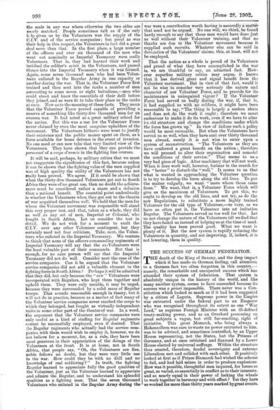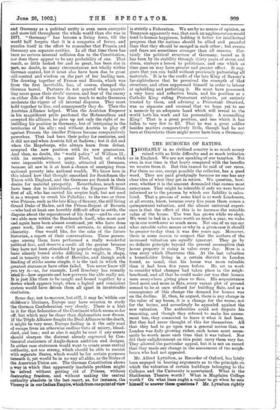THE SUCCESS OF GERMAN FEDERATION. T HE death of the King
of Saxony, and the deep impact which it has made on German feeling, call attention to a German fact too often forgotten in this country,— namely, the remarkable and unexpected success which has attended their system of federation. That system is absolutely unique in the history of the world, and like many another system, seems to have succeeded because its success was a priori impossible. There never was a Con- stitution which looked so much as if it had been suggested by a citizen of Laputa. Supreme power in the Empire was entrusted under the federal pact to an Emperor who was recognised throughout its extent as one " War Lord," as supreme Foreign Minister with an ill-defined treaty-making power, and as an Overlord possessing on great subjects a vague, but still far-reaching, right of initiative. This great Monarch, who being always a Hohenzollern was sure to waste no power entrusted to him, was to be advised, and sometimes controlled, by an Upper House representing, not the States, but the Princes of Germany, and at once criticised and financed by a Lower House elected by universal suffrage. Within the structure thus created, therefore, feudal sovereignty and extreme Liberalism met and collided with each other. It positively looked at first as if Prince Bismarck had wished the scheme to fail, and had laid mines in order to produce explosions. How was it possible, thoughtful men inquired, for forces so great, so varied, so essentially in conflict as to their interests, and so nearly equal in their power of locking the wheels to work together in harmony and with effect ? Yet they have so worked for more than-thirty years marked by great events, and Germany as a political entity is even more energetic and more felt throughout the whole world than she was in 187'1. " Germany ' has become a living force, till the world half forgets that it is a congeries of forces, and puzzles itself in the effort to remember that Prussia and Germany are separate entities. In all that time- there has been no serious internal collision due to the Constitution, nor does there appear to be any probability of one. That result, so little looked for and so great, has been due in part, no doubt, to many circumstances not wholly within German control, but it must also have been due to great self-control and wisdom on the part of her leading men. The drawing together of France and Russia, which was from the first inevitable, has, of course, clamped the German barrel. Partners do not quarrel when quarrel- ling must mean their rivals' success, and fear of the enemy On either side of them has done much to make Germans moderate the vigour of all internal disputes. They must hold' together to live, and consequently they do. Then the Austrian Alliance helped. When the Austrian Emperor in his magnificent pride pardoned the Hohenzollern and accepted his alliance, he gave up not only the right of re- building his position in Germany, but of intriguing in the territories of his ally ; and without Austria to play off against Prussia the smaller Princes became comparatively powerless. That had been their policy for centuries, and it did not end when Austria fell at Sadowa ; but it did end when the Hapsburgs, who always learn from defeat, accepted the new position with its new guarantees. And then, no. doubt, the " world policy " of William U., with its correlative, , a great Fleet, both of which were impossible without unity, attracted all Germans, because all saw in it at -least a chance of emerging from national poverty into national wealth. We know here in this island how that thought smoothed for Scotchmen the Union with England, and the Germans are Scotch in their desire for material prosperity. Nevertheless, much must have been due to individuals,—to the Emperor William first of all, who has carried his sceptre high, but not used it as a weapon to crush his Paladins ; to the two or three wise Princes, such as the late King of Saxony, the still living Grand Duke of Baden, and the Prince-Regent of Bavaria —who had at least one horribly difficult affair to settle, the dispute about- the separateness'• of his Army—and to one or two able men within the Bundesrath itself, who must now and again have been almost overtaxed, yet who have done great work, like our own Civil servants, in silence and obscurity. One would like, for- the sake of the future historian, a report of their conversations. These person- ages among them have performed a really wonderful political feat, and deserve a credit all the greater because they have not been stimulated by .popular applause. They have silently bound sticks differing in weight, in shape, and in tenacity into a club of Hercules, and though such binding of sticks seems simple, it is the task in which the greatest statesman have often failed. You never know till you try it—as, for example, Lord Rosebery has recently tried it--how separate and how perverse the able really are. It is just like them to be caught and bound together by a device which appears inept, when a logical and consistent system would have driven them all apart in inextricable confusion.
Some day, not to-morrow, but still, it may be,-within our children's lifetimes, Europe may have occasion to study the German Confederation very closely. There is a hint in it for that federation of the Continent which seems so far riff, bit which may be closer than diplomatists now' dream. If the Triple Alliance fought the Dual Alliance to the death, it might be very near, Europe finding in it the Only road of escape from an otherwise endless vista of misery, blood- shed, and loss ; and so also it might be near if any-events should sharpen the distrust already expressed by Con- tinental statesmen of Anglo-Saxon ambition and designs. In either case statesmen would want to create some central authority, not too strong, which should be able to coexist with separate States, which would be for certain purposes beneath it, yet would be in no way all alike, as the States of the American Union are. The German Constitution shows ar way in which that apparently insoluble problem might be' solved without getting rid of Princes, without destroying freedom, and without making the central authority absolute in the last resort, as, for instance, the Viceroy is in our Indian Empire, which from one point of view is strictly a Federation. We are by no means of opinion, as Tennyson apparently was, that such an agglomeration would tend to human happiness, holding it better for intellectual progress that the nations should be allied and peaceful than that they should be merged in each other ; but events and fears are sometimes stronger than all reasons. Cer- tainly the political structure of Germany, tested as it has been by its stability through thirty years of storm and stress, conveys a lesson to politicians, and one which as time goes' oes on may have greater and greater effect. It sug- gests 'that you can build without previously pulverising all materials. It is to the credit of the late King of Saxony's far-sightedness that he perceived the strength of that structure, and often suppressed himself in order to labour at uphialding and perfecting it. He must have possessed a very keen and reflective brain, and his position as a Catholic King ruling Protestant subjects, yet entirely trusted by them, and advising a Protestant Overlord, was so separate and unusual that we hope yet to see a memoir by an adequate hand which will reveal to the world both his work and his personality. A counselling King ! That is a great position, and one which it has fallen to very few to fill. That he was a great soldier besides matters comparatively little, though had he not been at Gravelotte there might never have been a Germany.



















































 Previous page
Previous page